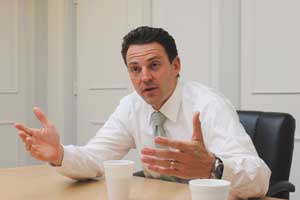
The Mayor’s Race
For what will likely be San Diego LGBT Weekly’s final mayoral Q&A, Nathan Fletcher came to our offices in Banker’s Hill to be interviewed on vital topics ranging from the local economy to the city’s wide array of social issues. Fletcher had a one-word answer to the big question: “Do you support same-sex marriage?” His answer was “Absolutely.”
LGBT Weekly: I know you’ve been asked why you made the switch from being a Republican candidate for mayor to an Independent. Why did you join the GOP to begin with?
Nathan Fletcher: There are issues where I probably wind up more with the Republican approach – economic issues maybe.
Taxes?
Competitiveness of the workforce; yes maybe taxes. I think when I was a little guy growing up the defining president of my time when I was little was President Reagan. He really restored faith in what it felt like to be an American. And I feel he really shared the working-class, blue-collar family values of my upbringing. You know, my dad was a factory worker. I vividly remember Reagan Democrats and the vision of the American Dream and opportunity that he represented.
Were your parents Reagan Democrats?
Yes they were.
Was your dad a union worker?
Yes he was.
That’s an interesting dichotomy in the sense that people who belong to unions are traditionally Democrats; yet he was a Reagan Democrat, which meant he voted Republican.
Yeah, and I think it was that and heading into military service in the Marine Corps that (led to my becoming a Republican).
But what the GOP has become is different than it once was. There used to be a place for socially progressive; environmentally conscience; fiscally responsible – pragmatic members that actually want to govern and make a real difference. That’s not the case anymore.
It’s been almost forty years since Ronald Reagan said the same thing of the Democratic Party – that he didn’t leave it; the Democratic Party left him.
Part of my frustration has been (the GOP’s) adherence to the far right. For example on what should be easy issues like (the repeal of) Don’t Ask, Don’t Tell. I was in a meeting with all the Republicans and they asked me, “Are you going to speak on this issue?” And I said, “Yeah, I’m going to speak on it.”
Did you get any support from your former party on DADT?
They said that was great; and wanted to be sure I was going to speak for keeping the policy. I told them, “No, I’m going to speak from a different perspective.” They said, “No, you can’t do that.” I said, “Well, sure I can.” There was this great consternation; they wanted me to consider just being absent (the day when a resolution supporting the repeal of DADT was to be considered). That struck me as this strict adherence to the far right and that’s bad.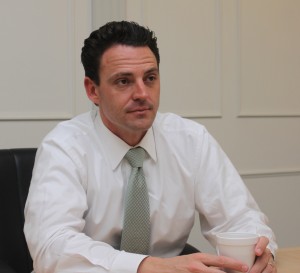
The other thing that’s bad is that there’s not a desire, even when the principles line up, there’s not a desire to solve problems. It’s just games-playing. It’s political brinksmanship. So, I go work out a tax-reform deal with (Gov.) Jerry Brown to close a loophole that only benefits large out-of-state corporations. Now closing that loophole by itself would be great for California. It makes California more competitive. California’s CEOs like Paul Jacobs of Qualcomm, Greg Lucier of Life Technologies; I could go on and on – they said please do this because the loophole gives our out-of-state competitors an unfair advantage. Boom. We close it, but we actually give the revenue to provide some relief to small businesses. That brings a billion dollars in new revenue into the state.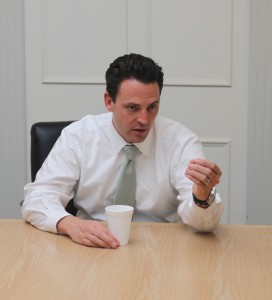 Jerry Brown agreed that we would cut taxes for small businesses that are hiring because that gets people back to work; we would lower the sales tax on durable goods to encourage manufacturing. We’re losing those manufacturing jobs and those are the jobs of the middle class. And then we would give relief to the working poor, who have been hit hardest by the recession.
Jerry Brown agreed that we would cut taxes for small businesses that are hiring because that gets people back to work; we would lower the sales tax on durable goods to encourage manufacturing. We’re losing those manufacturing jobs and those are the jobs of the middle class. And then we would give relief to the working poor, who have been hit hardest by the recession.
Did that bill make it to the floor?
Oh, I got it out of the Assembly – but barely. But it got killed in the Senate. Republicans opposed it. Republicans came up and said, “Wow, we’re going to make California more competitive by eliminating the loophole that encourages businesses to get out of California; we’re going to cut taxes on small businesses, manufacturers and the working poor.” And they said, “What a great thing.” I said, “So, you’re going to vote for it?” And they said no.
Because it takes away one of their foils against Democrats?
We can’t make Jerry Brown look good.
So, along that line; you have been criticized by some of the candidate asseessments that have been put out by other campaigns concerning you. We’ve looked at those, and it’s based upon two tax votes and two LGBT-equality votes. I understand what the two LGBT-equality votes are about: You voted to allow transgender people get their driver’s license in their new gender, and you voted for the FAIR Edtucation Act, which says, LGBT People do exist and our history can be taught in schools. Tell our readers about the two tax (votes) …
I’ve been scorecarded by so many different organizations. One of those was the “single sales” tax (a law that San Diego’s biotech consortium, Biocom credits Fletcher for helping to get passed, which rewards companies for capital investment for things like building constructed in the state – link to a previously published article about the so-called single sales tax). The other one I think they’re probably talking about is one I took a temendous amount of grief for – Renewable Portfolio Standard, RPS, which basicaly was just making a committment to renewable energies. People like (Councilman Carl) DeMaio and others have mischaracterized those two. They’re both job creators that make California a more competitive place. There are so many places where I go in the state where industries like soytech are hiring people.
With the advantage California has in the cleantech business, how would you work here in San Diego to capitalize upon that?
Well, we have a huge opportunity in those fields. We already have the beginnings of clusters in renewable energy, algae-based energy, solar, and so many other ways. The whole thought of being the world’s most innovative city in terms of changing and rebranding our image is about really nurturing an culture of innovation and cultivating those innovative jobs. You do it by streamlining your regulatory process. You know, Sapphire Engergy has an incentive to move here. I ask so many CEOs what they need to creat jobs. They say, “we have the jobs; we need a trained workforce.” So it’s about education. We’ve called for the creation of a STEAM Academy – science, technology, engineering, the arts and math as a feeder school to get those students transfered into those programs in the UC system.
Would your STEAM Academy be located in the southern part of the city?
I don’t care; it doesn’t matter where it’s located.
Would it be a priority to make easily accessible to economically challenged students?
Sure. I mean the problem with our education system today is we’re not producing the workers we need for today’s market. The second problem is that the education system is the equalizer that get’s you to the American Dream. I mean, we don’t promise you equality of outcome. We don’t give everyone the same size house; we don’t even promise you equality of ease (to get an education).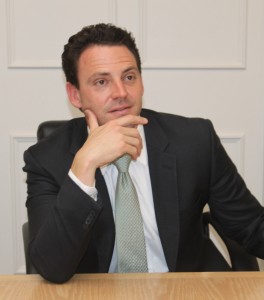 You know, neither of my parents went to college. It was harder for me and my brother. That’s OK; we’re not complaining. It will be easier for my boys and that’s good. But we do promise you equality of access; and we’re not providing that now in the public schools. When 58 percent of Latinos can’t read at grade level, that’s immoral.
You know, neither of my parents went to college. It was harder for me and my brother. That’s OK; we’re not complaining. It will be easier for my boys and that’s good. But we do promise you equality of access; and we’re not providing that now in the public schools. When 58 percent of Latinos can’t read at grade level, that’s immoral.
…
We have a city that has not seen an equal distribution (of resources). You go to the community in the southeast San Diego community of Stockton; they don’t even have street lights. Now, can you imagine if Kensington didn’t have street lights? We can’t even fathom that. And I’m not mad at Kensington; don’t get me wrong: I love Kensington, and I’m glad they have street lights. My point is, how do we have a city where one community has been allowed to fall so far behind? Barrio Logan hasn’t had an updated community plan since 1978. I was talking to a guy with a restaurant in San Ysidro; Don Felix has been trying for like 20 years to get a sidewalk fixed. Our whole city has infrastructure problems. As mayor, I’m going to focus on rebuilding the entire city.
You talk about the city in a wholistic way; (Congressman) Bob Filner talks about it in terms of neighborhoods. Are you two talking about the same approach?
Yeah; but I am talking about neighborhoods too.
Do you think Downtown is done?
Well, no area is “done.” But I think Downtown has had a disproportionate share of prosperity and I think our focus has to be on the entire city; not just on one area. Now, where Bob and I may disagree in tone might be that I believe you rebuild the city by lifting up the entire city, not be dismantling one part of the city. So, I’m not going to pit one neighborhood against the other.
Let’s talk a little bit about the state’s budget. Are you in support of Gov. Jerry Brown’s current plan?
No.
You’re not. Why not?
Well there are a couple of things that are wrong with it. One of the biggest problems we have in the tax code is volatility. It is tremendously volatile and creates this boom-and-bust cycle. His plan only adds to that volatility.
In what way?
Well it increases taxes on the most volatile aspects of the econonomy – those at the top. I don’t think adding taxes to a broken tax code is the way to solve a systemic problem.
Do you think the state takes in enough revenue in terms of a percentage of the economy.
I think the state needs to grow; then it will take in a significant larger amount revenue. But you do that by reforming the tax code by actually incentivizing growth through the tax code. There are also a lot of simplification of the regulatory process that will help grow the economy. One thing I know is that the public has been very clear about over and over and over again: that they’re not going to pay more.
Well that’s kind of a universal dynamic. No one ever wants to pay more taxes. Isn’t it generally the responsiblity of leaders to say, “Look, here’s what we need to provide the government you say you want?” It’s the free-rider concept, which says everyone’s going to answer the question, how much would you like to pay? with an answer lower than what would be their proportional share in hopes that someone else will pick up the difference. Relating that to a local issue: pension reform. Do you you support the pension-reform plan? Won’t people under 55 be cut off and, in affect, be paying for the pensions of older retirees to remain higher by giving up retirement money from their pensions?
I support pension reform. Under this plan, as it was explained to me by TIAA Creff, a well-respected annuity company, employees with pensions will get seventy-five percent income replacement. Seventy-five percent; that’s good … When you ask employees if they’d rather have a five-year freeze on earning pension money from salary increases or not have a job, they overwhelmingly choose pension reform. The city made a series of very bad decisions. In the 1990s, they made the decision to finance a stadium and a convention center with pensions money. They some people in upper management retire early and take more money than they should have. That all created a $2.1 billion liability that everyone agrees we have to address.
You’re not saying that bulding the ballpark and the convention center were bad ideas.
(Emphatically) No; but it’s a bad idea to under fund the pension system to do it.
How would you have done it?
Well, I don’t know. I wouldn’t have taken money out of the pension system. I would have figured something else out.
Would you not have raised any taxes to do it?
There’s ways to do it. Taking money out of the pension system is just as bad as making bad decisions to give workers overly generous pensions …
Who do give credit for the pension reform plan?
The mayor. This has been the most contentious issue for the last ten years. But if I’m mayor, we’re going to address this problem and we’re going to move on. We have to move on because there are other problems in the city that we need to address. I’m not going to spend the next decade talking about pensions. When are we going to talk about rebuilding our economy; when are we going to talk about rebuilding our education system; when are we going to talk about acquiring new open spaces; when are we going to talk about dedicating canyon lands; about getting into compliance with the federal Clean Water Act; about rebuilding our neighborhoods and our parks and making our communities safe with the right amount of public safety resources..?
Mayor Sanders has been a leader in the fight for marriage equality. He’s been the co-chair of a group called Mayors for the Freedom to Marry. Will you pick up that mantel?
I would do the same.
You would take a place in that campaign?
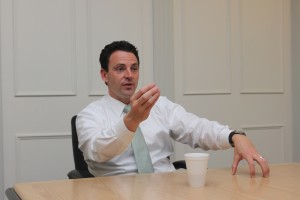 Yes. When an issue’s important, you have to be willing to take a stand and speak out for it. When I gave the floor speach on Don’t Ask, Don’t Tell, some people were very upset. But set that aside. There was an entire group of people who said, “hey, I’ve never thought about it. I’ve always been opposed to it. I listened to what you said and I thought about it; and you now what? You’re right.”
Yes. When an issue’s important, you have to be willing to take a stand and speak out for it. When I gave the floor speach on Don’t Ask, Don’t Tell, some people were very upset. But set that aside. There was an entire group of people who said, “hey, I’ve never thought about it. I’ve always been opposed to it. I listened to what you said and I thought about it; and you now what? You’re right.”
Those were Republicans?
Yeah. They just had to hear it from a different perspective. The problem in politics is people only listen to one side. They’re afraid to listen. People tell me their side of an issue and I think it makes sense. They want to know if I’m going to support it, and I tell them I don’t know yet, because I have to listen to the other side and see what they have to say. As mayor I’ll do the same.
I also had people say, “Hey, I’ve always believed the same thing, but I never felt like it was OK to say it out loud. But if a combat-veteran Marine from San Diego can say, then I can certainly say it.”
That’s the big issue for us: marriage-equality. And just to make absolutely clear, you would stand up and fight for it?
Absolutely.
What about ENDA? The Employment Non-Discrimination Act. Would you actively push for congress to pass ENDA?
Yes. I mean I’d have to look at the policy in detail. But in principal, yes.
By supporting our community in those LGBT-specific issues, you’ve eliminated a whole set of other LGBT-equality questions. Those two issues cover many sets of equal rights. So let’s move on. Do you support the Dream Act?
My problem is when states come in and try to take on federal issues on their own. I opposed Prop. 187. I oppose what they did in Arizona. It was wrong. I can support a federal Dream Act.
Given your recent change to Independent status, will you support someone in the presidential election.
I don’t anticipate being active in that election. I’m focused on local issues.
Thank you for the interview.
NOTE: While there are four major candidates for mayor, San Diego LGBT Weekly has only published three Q&As (including this one) to help voters in the LGBT community decide who’s right for them. We expect candidate and city councilman Carl DeMaio will continue to not accept or acknowledge our several, multi-modal invitations to be a part of this series. The invitation stands. And, as we’ve previously committed: Neither this editor nor my publisher would write any commentary relating to Councilman DeMaio in the issue that would include his interview. – Ed.










